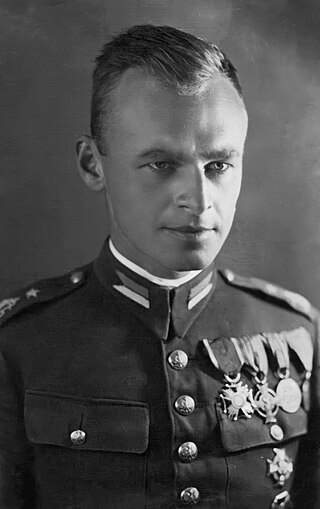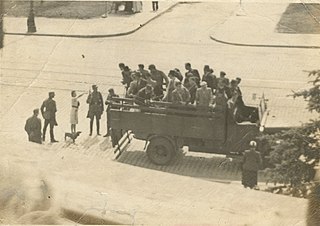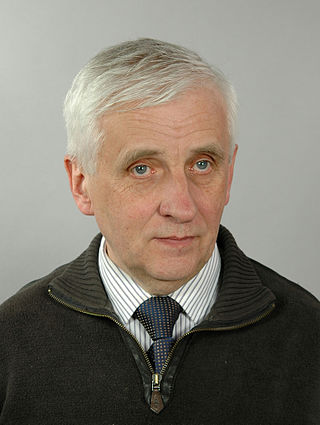
Józef Adam Zygmunt Cyrankiewicz was a Polish Socialist (PPS) and after 1948 Communist politician. He served as premier of the Polish People's Republic between 1947 and 1952, and again for 16 years between 1954 and 1970. He also served as Chairman of the Polish Council of State from 1970 to 1972.

Witold Pilecki was a Polish World War II cavalry officer, intelligence agent, and resistance leader.

Łapanka ( )(English: "roundup" or "catching") was the Polish name for a World War II practice in German-occupied Poland, whereby the German SS, Wehrmacht and Gestapo rounded up civilians on the streets of Polish cities. The civilians arrested were in most cases chosen at random from among passers-by or inhabitants of city quarters surrounded by German forces prior to the action.

Alfréd Israel Wetzler, who wrote under the alias Jozef Lánik, was a Slovak Jewish writer. He is known for escaping from Auschwitz concentration camp and co-writing the Vrba-Wetzler Report, which helped halt the deportation of Jews from Hungary, saving up to 200,000 lives.
Volunteering is the practice of people working on behalf of others without being motivated by financial or material gain.
Józef Garliński was a Polish historian and prose writer. He was a survivor of Auschwitz concentration camp and wrote books on the history of World War II, some of which were translated into English. In particular, his book Fighting Auschwitz, translated into English in 1975, became a best-seller.
Secret Polish Army was a Polish resistance movement founded in November 1939 in German-occupied Poland, which was active in the voivodeships of Warsaw, Podlasie, Kielce and Lublin.

In Poland, the resistance movement during World War II was led by the Home Army. The Polish resistance is notable among others for disrupting German supply lines to the Eastern Front, and providing intelligence reports to the British intelligence agencies. It was a part of the Polish Underground State.

The issue of why the Allies did not act on early reports of atrocities in the Auschwitz concentration camp by destroying it or its railways by air during World War II has been a subject of controversy since the late 1970s. Brought to public attention by a 1978 article from historian David Wyman, it has been described by Michael Berenbaum as "a moral question emblematic of the Allied response to the plight of the Jews during the Holocaust", and whether or not the Allies had the requisite knowledge and the technical capability to act continues to be explored by historians. The U.S. government followed the military's strong advice to always keep the defeat of Germany the paramount objective, and refused to tolerate outside civilian advice regarding alternative military operations. No major American Jewish organizations recommended bombing.

The "cursed soldiers" or "indomitable soldiers" were a heterogeneous array of anti-Soviet-imperialist and anti-communist Polish resistance movements formed in the later stages of World War II and in its aftermath by members of the Polish Underground State. The above terms, introduced in the early 1990s, reflect the stance of many of the diehard soldiers.
Związek Organizacji Wojskowej, abbreviated ZOW, was an underground resistance organization formed by Witold Pilecki at Auschwitz concentration camp in 1940.

Aquila Polonica is an independent publishing house based in the U.S. and the U.K., founded in 2005 by Terry A. Tegnazian and Stefan Mucha. The company specializes in books based on eyewitness accounts, in English, of Poland in World War II.

Witold's Report, also known as Pilecki's Report, is a report about the Auschwitz concentration camp written in 1943 by Witold Pilecki, a Polish military officer and member of the Polish resistance. Pilecki volunteered in 1940 to be imprisoned in Auschwitz to organize a resistance movement and send out information about the camp. He escaped from Auschwitz in April 1943. His was the first comprehensive record of a Holocaust death camp to be obtained by the Allies.

Piotr Śmietański was a Polish non-commissioned officer and communist functionary in the Ministry of Public Security and executioner at Mokotów Prison.

Jerzy Tabeau, an imprisoned Polish medical student, was one of the first escapees from Auschwitz to give a detailed report to the outside world on the genocide occurring there. First reports in early 1942 had been made by the Polish officer Witold Pilecki. Zabłotów-born Tabeau's report was known as that of the "Polish major" in the Auschwitz Protocols. After the war, he became a noted cardiologist in Kraków.

The organization of underground resistance movements in Auschwitz concentration camp began in the second half of 1940, shortly after the camp became operational in May that year. In September 1940 Witold Pilecki, a Polish army captain, arrived in the camp. Using the name Tomasz Serafiński, Pilecki had allowed himself to be captured by Germans in a street round up (łapanka) with the goal of having himself sent to Auschwitz to gather information and organize resistance inside. Under Pilecki's direction the Związek Organizacji Wojskowej, ZOW, was formed.

Adam Cyra is a Polish historian. A specialist in World War II history of Central Europe, he graduated from Jagiellonian University. Since 1972 he is a staff member of the Auschwitz-Birkenau State Museum in Oświęcim. His doctoral thesis at the Silesian University was on a Polish cavalry officer, intelligence agent, and resistance leader Witold Pilecki. He authored several dozen books and articles, mostly on World War II history of Poland and the Auschwitz concentration camp.
Jack Fairweather, is a British journalist and author.

The Auschwitz Volunteer: Beyond Bravery is a nonfiction 2012 book consisting of a report by Polish resistance fighter Witold Pilecki, an introduction written by historian Norman Davies and a foreword by Chief Rabbi of Poland Michael Schudrich. The diary has been translated by Jarek Garliński and was published in English by Aquila Polonica. It covers a period of about four years during which Pilecki was on a mission to infiltrate the Auschwitz concentration camp. Pilecki wrote his report in Polish in the summer of 1945 for his Polish Army superiors; this book was the first time his report was published in English. His mission had two principal goals: smuggle out intelligence about the camp, and build a resistance organization among the prisoners.
Fighting Auschwitz: The Resistance Movement in the Concentration Camp is a 1975 book by Polish historian Józef Garliński about the resistance movement in Auschwitz, published by Julian Friedmann Publishers. The book's primary focus is the Związek Organizacji Wojskowej underground organization formed by the Polish resistance fighter, Witold Pilecki, known for infiltrating the Auschwitz concentration camp to organize resistance on the inside. The book, despite being close to 50 years old, is still considered a "definitive study of the topic" by modern scholars.













